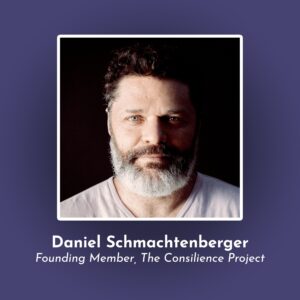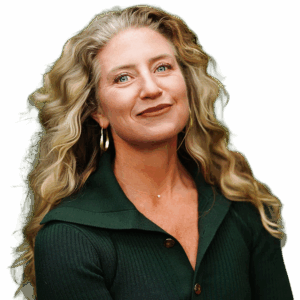
Ep 5 | Daniel Schmachtenberger
Daniel Schmachtenberger “Bend Not Break Part 1: Energy Blindness”
On this episode we meet with founding member of The Consilience Project, Daniel Schmachtenberger.
In the first of a five-part series, Nate and Daniel outline the macro risks and pathways for civilization to ‘bend’ and avoid ‘breaking’ in coming decades.
In the Part 1 conversation, Schmachtenberger flips the script to interview Nate about the urgent problems his research and work on energy, money, and growth confront. Nate explains how we can come to understand energy blindness and the overlooked role of oil in consumption, production, and progress since the Industrial Revolution. The dominant narrative of human progress prioritizes capital and labor — but the omission of energy and materials leaves out a key component to understanding how the modern human ecosystem functions.
Further, Nate discusses how a growth economy will inevitably lead to increased energy production and consumption, and how new energy technologies like renewables end up creating more energy output, not less. Putting everything together, in outsourcing our decisions and planning to a market dependent on growth, we have not so metaphorically become an energy hungry superorganism.
Finally, Daniel and Nate look forward to answering: What are ways for us to prepare for a post-growth economy? How can we stay balanced in the face of existential crises? What type of policy can help shape a future that is yet to arrive, and how can we get ahead?
About Daniel Schmachtenberger
Daniel Schmachtenberger is a founding member of The Consilience Project, aimed at improving public sensemaking and dialogue.
The throughline of his interests has to do with ways of improving the health and development of individuals and society, with a virtuous relationship between the two as a goal.
Towards these ends, he’s had particular interest in the topics of catastrophic and existential risk, civilization and institutional decay and collapse as well as progress, collective action problems, social organization theories, and the relevant domains in philosophy and science.
In French, we have a motto that says that a simple drawing is often better than a long explanation. Jean-Marc Jancovici Carbone 4 President
That’s very understandable because with left atmosphere thinking, one of the problems is that you see everything as a series of problems that must have solutions. Iain McGilchrist Neuroscientist and Philosopher
We can’t have hundreds and hundreds of real relationships that are healthy because that requires time and effort and full attention and awareness of being in real relationship and conversation with the other human. Nate Hagens Director of ISEOF
This is the crux of the whole problem. Individual parts of nature are more valuable than the biocomplexity of nature. Thomas Crowther Founder Restor
Show Notes & Links to Learn More
Download transcript01:45 – Daniel’s website
02:30 – Nate’s work on Macro-issues: Reality Blind Vol. 1, Reality 101 Energy Videos, Economics for the Future – Beyond the Superorganism
02:45 – Daniel’s work on micro-issues
05:30 – Consilience Project
08:40 – Marvin Harris – Cultural Materialism
11:20 – Energy is the currency of life and a core driver of nature
12:12 – Climate warmed and stabilized, propelling agriculture and creating more energy surplus
13:52 – Economics treats energy consumption like interest rather than principle
14:05 – One barrel of oil is equivalent to 5 years of human work (section 4.3)
15:10 – There is no substitute for energy
15:32 – GDP cannot decouple from energy
16:25 – The current financial system requires growth to continue
16:50 – Central banks are blowing up their balance sheets to keep the system going
17:20 – We are a superorganism
17:45 – Technology is dependent on energy
19:30 – Fourth Law of Thermodynamics – Maximum Law Principle
20:22 – Kleiber’s Law
23:08 – Anthropocene
23:45 – Inequality of consumption correlates with surplus
24:16 – Dunbar’s number
24:54 – Individual and cultural plasticity
25:20 – Exosomatic energy – the average american consumes >200,000 Kcals per day
29:07 – Stone age and overhunting
31:00 – Humans and livestock are 98% of mammalian biomass
31:17 – Total biomass is 700% of what it was 10,000 years ago
32:32 – Most of history our food system was a net energy producer, now it’s a net energy sink
33:15 – Our entire food system uses 10 times the energy that it produces
35:33 – Over the last 50 years GDP grew 100% while energy is growing 99% (Figure 2)
36:24 – Energy link to GDP, some countries reduce energy intensity from exports and imports
37:03 – Global GDP is still very tightly coupled
38:00 – Financial manipulation also creates the illusion of decoupling
39:58 – Wide boundary thinking
40:56 – Nate’s Hagens ~ Economics for the future – Beyond the Superorganism
41:11 – Jevons paradox
42:42 – Energy depletion
43:10 – Two categories of technology
47:55 – We are at diminishing returns on oil
48:25 – The nature of interest requires financial growth
49:30 – Potential vs Kinetic energy
51:24 – Renewables are actually rebuildables
51:50 – In 2019 the electricity demand grew by more than all the solar voltaic capacity ever built
52:40 – We are using more wood today than we were 100 years ago
54:45 – ER/OI – Energy Return on Investments
57:33 – Intermittence and variability
58:21 – Fossil carbons have a higher total system return on investment
59:37 – 20% of total global energy is electricity and many things aren’t replaceable by electricity
1:00:37 – We traded out human labor for mechanical labor, exponentially growing our system
1:04:06 – We underpaid for the core economic input and don’t pay for the negative externalities
1:05:15 – Tim Garrett – GDP and CO2 chart
1:06:35 – Full cost accounting for life cycle of coal
1:08:50 – 95% of taxes are on human labor
1:09:57 – Relationship between material consumption and GDP is 1:1 over last 50 years
1:10:02 – 2lbs of non-renewable materials for every dollar of GDP
1:10:11 – An American baby born today will use 3.1 million lbs of non-renewable materials in their lifetime
1:10:45 – Lithium and electric cars
1:11:10 – Everything made from a barrel of oil
1:13:05 – Waste that comes from mining
1:14:55 – What it takes to make a computer
1:15:40 – 2022 current events in Taiwan
1:17:50 – Dick Gephardt and advance policy
1:18:14 – Untax Project







